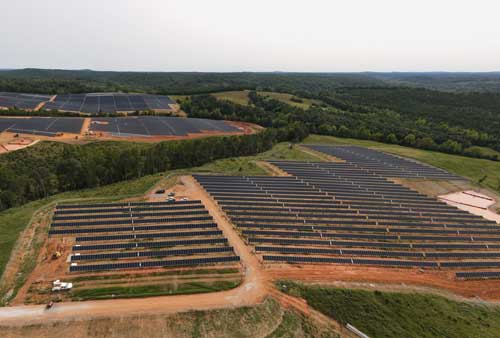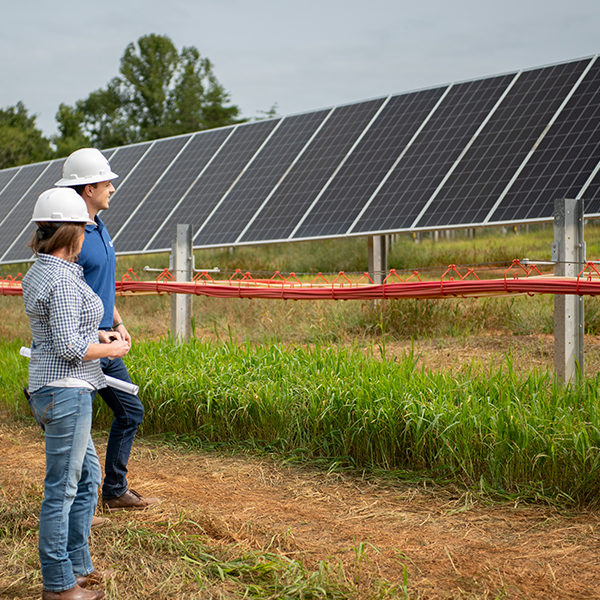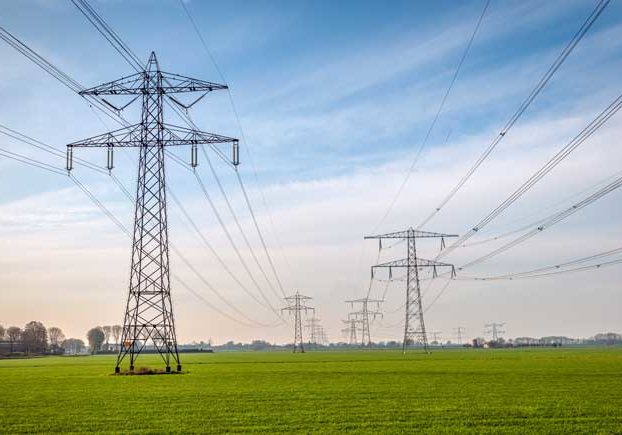North Carolina House Bill 951
Energy Solutions for North Carolina
House Bill 951 Energy Solutions for North Carolina (HB951) became law in October 2021, marking North Carolina’s largest energy policy milestone since the 2017 enactment of House Bill 589 (HB589). Like HB589, Energy Solutions for North Carolina first emerged from a House-led stakeholder process taking place over a series of months. The bill underwent several iterations in the House before the Senate made further changes to the bill, which largely were the result of negotiations between Senate leadership and the Governor’s office. NCSEA worked with lawmakers and fellow stakeholders from the beginning of the process through final passage of HB951. The team will continue working with stakeholders and various other parties throughout the implementation process. The following sections outline the major provisions of HB951 and the status of ongoing implementation efforts.
Stay up to date with our HB951 blog series:
Carbon Reduction

HB951 requires the NC Utilities Commission (NCUC) to take "all reasonable steps" to achieve 70 percent carbon emissions reductions from 2005 levels by 2030 and achieve carbon neutrality by 2050, essentially codifying the carbon reduction goals outlined in North Carolina’s Clean Energy Plan. The NCUC is also required to develop, with input from stakeholders and utilities, a Carbon Plan to meet these goals using a least-cost approach. The Plan must be developed by December 2022 and will subsequently be revisited every two years. The carbon reduction goals can be achieved through the use of technologies such as power generation, transmission and distribution, grid modernization, storage and energy efficiency measures, demand-side management, and the latest technological breakthroughs that meet the least-cost criteria. HB951 mandates that all new generation identified as part of the carbon plan process be utility-owned, with the exception of new solar and solar plus storage generation (which is subject to an independent power producer (which is subject to an independent power producer (IPP)/utility ownership split of 45 percent/55 percent under Section 1.(2)b.).
- Read Part I Section 1 of HB951
- View the latest filings in the Carbon Plan docket before the NCUC
- View the latest filings regarding Duke Energy’s petition to file its Carbon Plan jointly before North
- Carolina and South Carolina regulators here
- Learn more about North Carolina’s Clean Energy Plan
- Read Executive Order 80 and Executive Order 218, outlining North Carolina’s commitment to carbon reduction and offshore wind energy generation, respectively
Clean Energy Transition
Coal Retirement
HB951 requires securitization of 50 percent of subcritical coal plant retirements, resulting in an estimated $1 billion in un-depreciated coal assets to be securitized. Securitization is a financing mechanism that offers a fiscally sound and ratepayer-friendly option for the utility to pay off debt that would otherwise be shouldered exclusively by ratepayers. In 2019, North Carolina passed Senate Bill 559 to authorize storm securitization and help the utility recover storm-related costs. Coal securitization will work in a similar fashion. Before the utility can securitize early coal plant retirements, the NCUC will gather stakeholder input to determine rules for coal securitization in North Carolina.
- Read Part III of HB951
- View the latest filings in the coal securitization docket before the NCUC


2022 Competitive Procurement
HB951 establishes a pathway for competitive procurement of renewable energy in 2022 and beyond as HB589’s Competitive Procurement of Renewable Energy (CPRE) program reaches the end of its 45-month lifespan. HB951 authorizes the NCUC to direct utility procurement of solar energy facilities in 2022 in order to meet the bill’s carbon goals.
- Read Part I Section 2 of HB951
- Learn more about HB589’s CPRE program, and read Part II of HB589 here
- View the latest filings in the 2022 Solar Procurement docket before the NCUC
Solar Decommissioning
HB951 mandates the NC Department of Environmental Quality (DEQ) to develop a plan to ensure "adequate financial resources" for the decommissioning of utility-scale solar projects no later than March 1, 2022. The financial assurance study in HB951 is expected to build upon a report on renewable energy decommissioning produced by DEQ and stakeholders as mandated by 2019’s House Bill 329 Renewable Energy Amends (HB329).
Modified Power Purchase Agreements
HB951 allows for some independent power producers to blend and extend their existing power purchase agreement contracts with the utility for up to ten years.
- Read Part IV of HB951

Photo Credit: Apex Clean Energy
Regulatory Reform

HB951 reforms North Carolina's regulation of privately-owned monopoly utilities providing electricity services by establishing and authorizing performance-based regulation (PBR). The PBR provision allows for the utility to file for approval of multi-year rate plans (MYRPs) that incorporate one or more performance incentive mechanisms (PIMs) in addition to a decoupling rate-making mechanism for the residential customer class. The NCUC maintains the authority to approve or modify PIMs to make sure they encourage the utility to achieve certain policy goals, such as reducing low-income energy burdens and expanding energy efficiency opportunities.
- Read Part II of HB951
- Read NCSEA’s blog post about PBR rulemaking
- View the latest filings in the PBR rulemaking docket before the NCUC
Rulemaking

HB951 tasks the NCUC with implementing most provisions of the bill and with various rule-making responsibilities, including:
- Establishing coal securitization;
- Evaluating and modifying existing standby service charges;
- Establishing an on-utility-bill repayment program related to energy efficiency investments;
- Establishing a rider for a voluntary program that will allow industrial, commercial, and residential customers to purchase renewable energy or renewable energy credits from the electric public utility; and
- Revisiting net metering policies.
- Like HB951, 2017’s HB589 also required the NCUC to examine North Carolina’s net metering program. As regulators continue to be charged with reevaluating net metering policies, NCSEA and others signed an agreement with Duke Energy supporting the implementation of a new net energy metering program in North Carolina. The settlement, signed in December 2021 and much like a similar settlement approved in South Carolina, currently awaits NCUC approval.
- Learn more about net energy metering
- Read NCSEA’s statement on the recent settlement to revise North Carolina’s net metering policies.
Timeline: Deadlines for HB951 initial program implementation
Ahead of each of these major deadlines, NCSEA will be intervening at the NCUC and continually filing in each related docket to help shape implementation of HB951's programs. Stay up to date on HB951 implementation with NCSEA’s HB951 blog series, by following NCSEA on social media, and by checking back as this webpage is updated.


